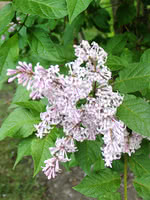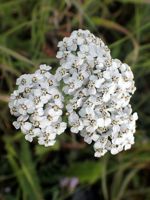Mon-Fri 9am - 5pm Mountain time
Villosa Lilac vs Yarrow
Syringa villosa
Achillea borealis (Previously Achillea millefolium)
NOT AVAILABLE THIS SEASON
(new stock expected: fall of 2026)
Popular Hedge Species!
Villosa Lilac is a relatively large and cold hardy shrub. It provides excellent privacy and wind protection.
Its fragrant, pink flowers grow in clusters at the end of its branches during mid to late summer and fade to a light pink over time. Villosa Lilac grows quickly and is drought resistant, making it suitable for the outer row of a shelterbelt. Its roots are non-suckering and it does not compete with nearby crops.
If you alternate Villosa Lilac and Common Purple Lilac in your hedge, your hedge will flower for more of the summer than if you plant either Lilac on its own.
Note: Villosa Lilac is more salt-tolerant than most of our stock.
Yarrow is a herbaceous, native wildflower that is found across Canada. It features large, flat clusters of tiny white flowers. The blooms attract a variety of pollinators, making it an ideal choice for pollinator gardens. While partial shade is tolerated, the best flowering occurs in full sun. Yarrow is resistant to deer and rabbits, making it both a beautiful and practical addition to your landscape.
The entire plant is edible, but leaves and flowers are most commonly consumed. They have a strong licorice scent and a mild sweet flavor that is similar to tarragon. Yarrow leaves can also be used as a natural insect repellent.
It is important to plant Yarrow in the right place, it can spread quickly via both rhizomes and self-seeding. Deadheading the spent flowers will extend the bloom season and can help limit self-seeding.
Villosa Lilac Quick Facts
Yarrow Quick Facts
In row spacing: 0.9 m (3 ft)
Toxicity: toxic to dogs, cats, and horses

